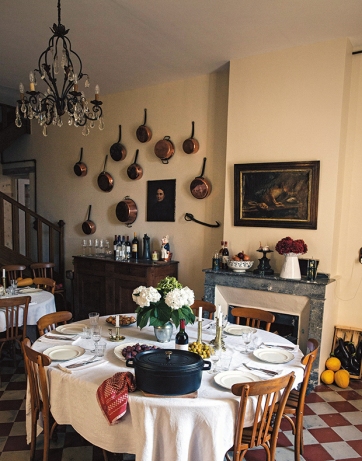I’m going to take a small detour from my usual focus on health and longevity. I believe that diving into this approach to health and wellbeing rooted in tradition requires taking an examination of traditional etiquette. I like to see how time honoured standards of doing and being have evolved to form our modern approach, and what gems have been lost in the process.
I will be covering three topics: food, sex and charity. I truly believe that nothing makes a person more elegant and attractive than a display of etiquette that hints at deeper held values. These values signify respect for oneself, respect for others, gratitude, and the kind of reverence that one holds for life.
Some perceive etiquette as outdated. In more extreme cases some see it as a way of ostracising, oppressing others and keeping social hierarchies. I disagree. I think that practicing good etiquette can be a tool to live a more rich and fulfilling life. They may seam like superficial actions, but as these actions become habits they will integrate and start to form your worldview.
Practising good etiquette sends a message to the world that you are a high-quality individual. But more importantly, it will make you a happy and healthy person who holds yourself in high regard.

#1 Food
I believe that civilisation started at the dining table. It’s where stories are shared, culture is transmitted; where one feels a sense of belonging and partakes in the rituals, customs and traditions of the community. Food is a deeply intimate subject and people often form social groups based on shared eating habits. In most world religions there are taboos around which foods can and cannot be eaten at which times. Food is essential to surviving and thriving. This section focuses less on what we eat and more on how we eat.
Table manners can say a lot about someone – notably their respect for other people. Although coming from a good family can give you a head start with dining etiquette, anyone can learn at any stage in their life because at the core it’s about showing gratitude, being present with the meal and being aware and considerate of those who you’re sharing a meal with.
Table manners may appear superficial but really cut to the core of how we operate in the world: our respect for others, for ourselves, for food, tradition, culture and social connection.
Have you ever heard the saying ‘how you do one thing is how you do everything’? I think this is especially relevant in regards to table manners. How you eat says a lot about the person that you are. Are you messy or neat? Do you see and appreciate what you’re eating, or is it just a matter of fuelling yourself? Are you sensitive to other people’s dining experience and do you eat in a way that makes them feel comfortable? Are you respectful of waitstaff or are you rude and demanding? These things may appear superficial but really cut to the core of how we operate in the world, our respect for others, food and tradition.

#2 Sex
There’s nothing less elegant than chasing ‘pleasure’ as the highest good. Not only is it not elegant; it’s primitive, vapid and meaningless. Picture this image: a woman with no self-respect and no self-control. She wants to eat, she scoffs down her hamburger and fries. She doesn’t find meaning in food so she goes for the cheapest, most processed and least nourishing option.
She bludges at work because she doesn’t like to work hard. She finds no meaning in work, so she doesn’t care to find the right job where she can put her skills and talent to use. It’s easier not to try. Instead she works to pay the bills and pass the time. She spends her spare time watching Netflix series and porn because it’s easy, mindless and entertaining.
She has sexual desires too. And when she needs these to be fulfilled she logs onto an app. Sometimes she goes out clubbing with her friends. But it always ends the same – sleeping with a man she barely knows but who showed her a bit of attention which felt nice. She enjoys sex, but sees it as just that – two people finding pleasure in their bodies. She has even cheated on partners in the past, because she doesn’t like the idea of adhering to any social standard or feeling restricted in how she finds her pleasure. The only problem is – this isn’t real pleasure. It’s as meaningless as her Netflix series.
And this is what the culture of modern dating has become – people chasing that ‘it feels good’ pleasure hit without any concern for any higher value. You may have the impression that I’m ‘anti-sex’ and ‘prudish’. This isn’t the case at all. It’s almost the opposite.
I believe that sex is so powerful and integral to our identity and selfhood,that it shouldn’t be squandered as a mere form of entertainment
I believe that sex is so powerful and integral to our identity and selfhood,that it shouldn’t be squandered as a mere form of entertainment at best (when both parties are participating for pleasure), or a commodity at worst (when someone offers sex as a means to get something – money, affection, favours etc).
Sex has an enormous capacity to make us feel loved, seen and like fully integrated into ourselves. This is why sexual trauma’s are the most damaged to one psyche – because they cut at the deep roots of what it means to be human and hinder our capacity to both love and be loved.
So what does this have to do with elegance? The elegant women is high quality and knows her worth. She knows that sex has a profound ability to both empower and traumatise, so she exercises caution when choosing how to have these experiences. She pursues deep sexual experiences over shallow sexual attention. Because how you honour your sexuality is how you honour yourself.
My etiquette advice in how to approach sexuality is this: start by having a meaningful connection with someone – by valuing and respecting them and making sure that this is reciprocal. If you feel like this person will respect the deepest part of yourself and you feel like you want to show them that – then sex can follow.

#3 Charity
There’s nothing more elegant than someone who is willing to sacrifice their desires in order to help others. Especially when this is a natural instinct, and not done to attract attention. This is the virtue of charity.
This ties into the idea outlined above – that etiquette is about overcoming our basic, primal instincts – for food, for sex, for selfishness – and to act in a way that is a fusion of pleasure and self-respect. And how you respect others is how you respect yourself.
Charity means that you can overcome the primal drive for selfishness, and instead express a more cultivated approach which is co-operation, self-sacrifice and charity.
Being sensitive to the needs of others and acting in a way that aims to alleviate their suffering, hardships or even just mild discomfort, means that you can show empathy. It means that you can overcome the primal drive for selfishness, and instead express a more cultivated approach which is co-operation, self-sacrifice and charity.
I’m not saying that you should run yourself to the ground by only giving to others and never taking care of your needs. This is where it’s important that a sense of charity is coming from a place of self-respect; not a place of trying to prove your worth or make people like you by giving and giving until you’ve run empty. Self-respect involves having strong boundaries and knowing your worth – and knowing how to elegantly put your foot down when people try to violate your boundaries or undermine your self-worth.
Conclusion
Three social etiquettes to keep in mind. If you incorporate into your life you will see big improvements. You will be happier, you will be more gracious and you will be more elegant – in your own eyes and in the eyes of others.
